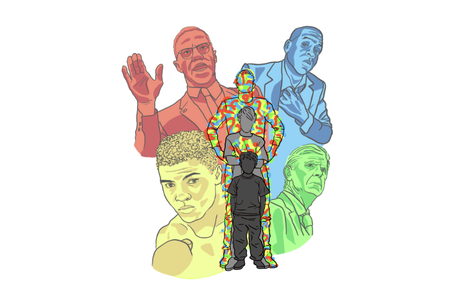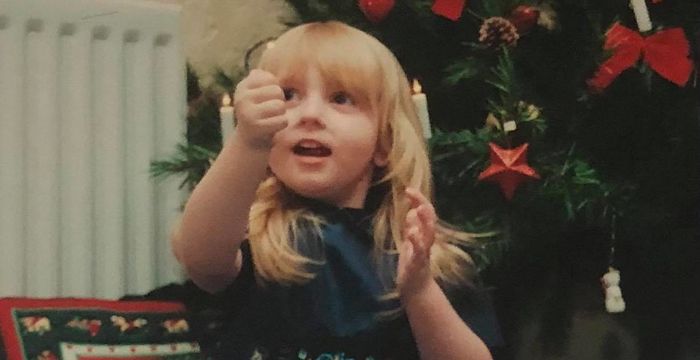The myth of the ‘father figure’
Sharing his experiences of being raised in a single-parent household, Zakariyya Ali unpacks how the concept of the ‘father figure’ has manifested itself through various other forms in his life

My parents divorced when I was very young. Since the age of a few months old, I was raised by a single mum. I have tried to avoid bringing up the topic of my father throughout my life — not because of any inherent feelings of embarrassment or sadness, but because it would always seem to dampen the mood the second that I mentioned it. “I’m sorry to hear that”, was the near-automatic response. “Nah, it’s not that deep”, I would reassure those awkwardly seeking to console me for something I was not very bothered about. As an only child raised by a single mum, I would often make up stories about how my dad was working elsewhere when the inevitable question of 'what does your dad do?' came up. I’d write Father's Day cards in school, steeped in bright blue and covered in sketches of footballs, only to leave the masterpiece to decay at the bottom of my backpack.
“What was so repulsive about being raised by a woman?”
Despite not feeling any sense of deprivation or psychological malaise because of being a child of a single-parent home, there nevertheless persisted a sense of stigma around the fact that I never did fit the archetypal, nuclear familial model which a lot of my friends shared. I was constantly told by my peers, distant relatives and quasi-scientists that I needed a “father figure”, that it was essential to my development. Whatever that means. I repeatedly asked myself why this individual was so necessary for allowing me to grow into a fully-fledged, law-abiding citizen, with a squeaky clean criminal record and no signs of delinquency. What was so repulsive about being raised by a woman? I never felt impaired in any way, nor did I see myself at some implicit advantage. And yet the stigma persisted.
“I had the unique gift of being able to ‘pick and choose’ whose principles I would internalise”
Jay-Z, in his autobiography Decoded, described his fatherless upbringing as a 'gift', stating that 'we got to pick and choose the ancestors who would inspire the world we were going to make for ourselves'. Brushing away the imaginary concept of the ‘father figure’, I similarly took inspiration from the lives and accomplishments of individuals like Muhammad Ali, Malcolm X, and even former football manager Arsene Wenger. whom I would religiously watch guide my beloved Arsenal to sporting success on a weekly basis. Equally so, I sought advice on how to navigate the world as a young lad from a plethora of individuals, both male and female, thus forming somewhat of my own 'father figure' out of an eclectic mix of varied perspectives, lived experiences, and worldviews. I quickly learned that there was no single blueprint to growing up, nor was there some omniscient male figure that was necessary for my development.
I was also extremely lucky to have an environment that did not lead me down a negative path. My boxing coach, teachers, friends, and of course my mother, all played a role in shaping who I am today, such that I never felt any sense of deprivation as a result of my fatherless upbringing. Just like Jay-Z, I had the unique gift of being able to 'pick and choose' whose principles I would internalise, and whose counsel I would seek.
There is a distinct scene from The Fresh Prince of Bel-Air that many will be familiar with. In the episode ‘Papa’s Got a Brand New Excuse’, Will Smith comes to grips with the loss of his absentee father for a second time, embracing Uncle Phil in a heart-warming moment as he cries out: 'how come he don’t want me?'. Will Smith, whose parents also divorced, was rumoured to have improvised that entire scene, leaving the audience, of a normally laughter-provoking sitcom, entirely silent. Throughout the entire show, it is Uncle Phil who takes on the role as the 'father figure', and not the character of Will Smith’s biological father. Much like Uncle Phil, who is equally able to rule with discipline and show unconditional love to his nephew, I am lucky to have a supporting corner in my mother who is there to play 'mum' and 'dad' when necessary, whatever those terms mean in reality. There is no number one familial model for psychological and material success, and I have spent my life coming to terms with this fundamental fact.
What people like Jay-Z, Will Smith, Adele, or Barack Obama demonstrate is that success has no definitive background, that it simply does not require a mythical father figure, and — most importantly — that it is crucial for us to be proud of our ‘anomalous’ upbringings, regardless of what others may think.
 News / Eight Cambridge researchers awarded €17m in ERC research grants27 December 2025
News / Eight Cambridge researchers awarded €17m in ERC research grants27 December 2025 News / Downing investigates ‘mysterious’ underground burial vault 29 December 2025
News / Downing investigates ‘mysterious’ underground burial vault 29 December 2025 Lifestyle / Ask Auntie Alice29 December 2025
Lifestyle / Ask Auntie Alice29 December 2025 Sport / Hard work, heartbreak and hope: international gymnast Maddie Marshall’s journey 29 December 2025
Sport / Hard work, heartbreak and hope: international gymnast Maddie Marshall’s journey 29 December 2025 Interviews / Meet Juan Michel, Cambridge’s multilingual musician29 December 2025
Interviews / Meet Juan Michel, Cambridge’s multilingual musician29 December 2025









